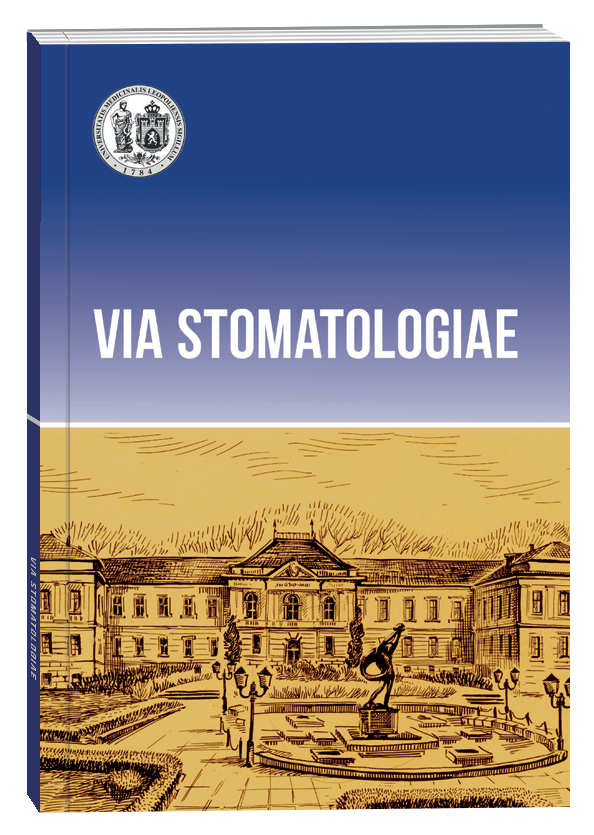PECULIARITIES OF ADAPTATION TO FULL DENTURES FOR PATIENTS WITH DIFFERENT INDIVIDUAL PSYCHOLOGICAL CHARACTERISTICS AND ITS IMPACT ON THEIR QUALITY OF LIFE
DOI:
https://doi.org/10.32782/3041-1394.2024-3.6Keywords:
edentulous jaw, removable denture, psychological status of patient, neuroticism, condition of prosthetic bed, adaptation, quality of lifeAbstract
Introduction. The main factors of human adaptation to removable dental prostheses are individual psychophysiological, vegetative characteristics, and peculiarities of reaction to stressful effects of receptor zones of the oral cavity in the area of the prosthetic bed under conditions of afferentation. The psychoemotional state of patients is largely determined by such a stable character trait as neuroticism. This indicator is closely related to the severity of their emotional manifestations in stressful conditions and affects their quality of life. The aim of the study. To analyse, on the basis of assessment of quality of life, the processes of adaptation to removable full dentures in patients with different individual psychological characteristics depending on the condition in the areas of the prosthesis bed. Research materials and methods. Clinical observations involved 35 elderly and senile patients (60 to 80 years old) who underwent orthopedic treatment for complete adentia of the upper or lower jaws with complete dentures for the first time. The level of neuroticism was determined in all patients by testing according to the G. Eisenk method. The effect of complete removable dentures on the quality of life of patients was assessed by their subjective assessment based on the GOHAI (Geriatric Oral Health Assessment Index) questionnaire. The condition of the oral mucosa in the area of the prosthetic bed was assessed according to the Suplee classification. The degree of atrophy of the alveolar processes of the lower jaws according to Keller was taken into account. Statistical analysis of the study results was performed using Student’s t-test. Results. Firstly, the influence of the patient’s psychological status and the state of his prosthetic bed in the oral cavity on the process of adaptation of the body to a complete denture, which affects the quality of life, was revealed. Patients with a low level of neuroticism (the first clinical group) in most cases during the survey (questionnaire) on the 3–4 th day of adaptation to removable dentures indicated a satisfactory feeling of getting used to removable dentures. Only 6 people with Suplee classes II and III edentulous mucosa noted a deterioration in the quality of life due to discomfort during chewing, difficulty biting off food, and sensitivity to hot, cold, or sweet food. The most unfavorable were the 2nd and 4th types of atrophy of the alveolar processes of the lower jaws according to Keller. In general, in this clinical group, the total score of self-assessment of the oral cavity according to the GOHAI index on the 3–4th day of adaptation to removable dentures was 48,5 ± 4,2 points. In the process of adaptation, there was a decrease in the indicators of deterioration in the quality of life and improvement of subjective sensations: by 7–8 days – in 12 people who had class I of the mucous membrane of edentulous jaws according to Suplee, and by 14–15 days – in 6 people who had classes II and III of the mucous membrane of edentulous jaws according to Suplee. Half of the patients of the second clinical group, regardless of their initial condition of the oral mucosa in the area of the denture bed, during the questionnaire indicated a feeling of discomfort during chewing and difficulty biting off food, as well as the sensitivity of the mucosa to hot, cold or sweet food. In this clinical group, on the 3–4th day of adaptation to removable dentures, the total score of patients’ self-assessment of the oral cavity according to the GOHAI index was 97,1 ± 3,5 points, p < 0,001. Only by 21–22 days there was a statistically significant decrease in subjective feelings towards dentures in patients of this clinical group – 14,5 ± 1,9 points, p < 0,05. Conclusions. 1. Anxiety, and emotional discomfort with a tendency to negative selfassessment of quality of life, with potentially unsatisfactory and prolonged adaptation to an orthopedic dental structure (complete removable laminar denture) characterize patients with an increased level of neuroticism. 2. The state of the oral mucosa in the area of the prosthetic bed significantly affects the subjective sensations in the early period of adaptation to complete removable dentures in patients with different levels of emotional lability (neuroticism).
References
Duration and length of adaptation to new complete dentures: a survey based on patients’ self-reported outcomes / R. Poljak-Guberina et al. Stoma Edu J. 2022. № 9 (1). Р. 45–53.
Makieiev V., Hunovskyi Ya. The features of patient adaptation to removable partial dentures based on the dynamic study of the mucous membrane condition of an oral cavity in the new functioning conditions. Сучасна стоматологія. 2022. № 3–4. С. 33–37.
Relationship between Geriatric Oral Health Assessment Index (GOHAI) and Oral Health Status of the Institutionalized Elderly in Mangalore, India / P. Ravi et al. Indian J. Public Health. 2019. № 10. Р. 147–150.
Biomechanics of oral mucosa / J. Chen et al. J. Soc. Interface. 2015. № 12 (109). Р. 20150325.
Denture-Mucosa Pressure Distribution and Pressure-Pain Threshold in In Vivo, In Vitro and In Silico Studies : A Literature Review / A. Paras et al. Oral. 2022. № 2. Р. 112–125.
Клінічний стан тканин протезного ложа в пацієнтів, які користуються різними адгезивними засобами для покращення фіксації знімних протезів / Ю.В. Редушко та ін. Сучасна стоматологія. 2020. № 1. С. 96–99.
Профілактика больового синдрому при користуванні знімними протезами / М.Я. Нідзельський та ін. Медицина болю (Pain Medicine). 2018. Т. 3. № 1. С. 67–70.
The Problem of Patients’ Adaptation to Full Removable Dentures / V. Galonsky et al. Medical University. 2019. № 2 (3). P. 66–73.
Development and Validation of a Questionnaire Evaluating the Impact of Prosthetic Dental Treatments on Patients’ Oral Health Quality of Life: A Prospective Pilot Study / E. Mijiritsky et al. Int. J. Environ. Res. Public Health. 2020. № 17. 5037 р.
A Persian version of Geriatric Oral Health Assessment Index / M. Rezaei et al. Gerodontology. 2016. № 33 (3). Р. 335–341.
Dental anxiety in relation to neuroticism and pain sensitivity. A twin study / O. Vassend et al. J Anxiety Disord. 2011. № 25 (2). Р. 302–308.
Relationship of neuroticism and laboratory pain in healthy children: Does anxiety sensitivity play a role? / L.A. Payne et al. Pain. 2013. № 154 (1). Р. 103–9. DOI: 10.1016/j.pain.2012.09.013.
Investigation of trait anxiety as a predictor of dental anxiety / I. Olszewska-Czyż et al. J. Stoma. 2016. № 69 (4). Р. 403–11.
Семиченко В.А. Психологія: Темперамент : навчальне видання. Київ : Видавництво О.М. Ешке, 2006. 200 c.
Atchison K.A., Dolan T.A. Development of the geriatric oral health assessment index. J Dent Educ. 1990. № 1002. Р. 0022–0337.
The problem of patients’ adaptation to full removable dentures / V. Galonsky et al. Medical University. 2019. № 2 (3). P. 66–73.
Influence of psychological factors on the acceptance of complete dentures / F. Quran Al et al. Gerodontology. 2001. № 18 (1). Р. 35–40. DOI: 10.1111/j.1741-2358.2001.00035.x.
Oral Health-Related Quality of Life, Dry Mouth Sensation, and Level of Anxiety in Elderly Patients Rehabilitated with New Removable Dentures / L.C. Bannwart et al. Eur J. Dent. 2022. № 16. Р. 351–359.







